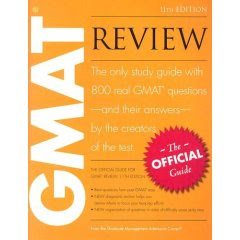*It is important to know the score you need to be competitive at your choice Business School before you begin preparation*
1. Start out with a computer practice-test to see where you stand.
2. Practice all quantitative and verbal sections of the exam using the questions in the official guide starting with the easy ones(the questions range in difficulty as they go – question 1 is the easiest). Do every tenth question or so. When they become difficult, start doing clusters of questions (every 3rd or 4th question) at that level until you begin to get them correct. Then resume practicing every tenth question until you start missing again and repeat as before. Do this until you proficient to about the last 20 questions in each section.
*It is important to leave several open questions as you go so that you can do some capstone testing on fresh questions at each level of difficulty at the end of your initial preparation.
3. Once you have some reps on each section and you are getting most of them right, do several mini tests. A mini test should consist of 3 to 5 questions of varying difficulty from each section. It is important to do easy, mid-range, and hard questions during these mini tests because this is what the actual test will do. I found myself sometimes over-thinking the easy and mid-range questions until I had enough practice to recognize the approximate difficulty of the question right away.
4. Once you are getting most of the questions in your mini-tests correct on a consistent basis, take the second computer practice-test. If you are scoring where you want to, go ahead and make your exam appt. and keep mini-testing yourself until the day of the exam. If not, focus in on the areas that are lacking with some more reps. Maybe 10 or 20 questions from the sections you are struggling in. Try and pick questions that are similar to the ones you missed. Once you feel comfortable go ahead and do some more mini tests. This is the hardest part of the prep. I actually did 50 or 60 data sufficiency questions in a row at this stage as I was severely handicapped in this area at first.
5. If you feel comfortable you have two options at this point. The first is to schedule and take the exam. The second is to re-take the first computer practice-test. It should show you very different questions than you saw your first time through since your aptitude will be dramatically increased by this point. If you score in your target range go ahead and schedule the exam and do mini-tests every day to keep your mind sharp. If not, get some more reps and take the computer practice-test 2 again.
This 5 step process is not only cheap, but it is a very effective way to prepare for the GMAT.
If you find yourself at a serious sticking point the best solution may be to search craigslist and find a private individual who has experience taking the test who can help you decipher the questions that are giving you trouble- but stick to the official guide. Some of the other test prep books will help you marginally, but they don’t mimic the style of the test. Again, understanding the way the questions are worded and the style the problems are in will be the hardest part of the exam.
If all of the above doesn’t work for you, then you may want to seek alternative preparation techniques including classes and other resources, but these five steps will be a productive foundation even for those individuals who need more.






























